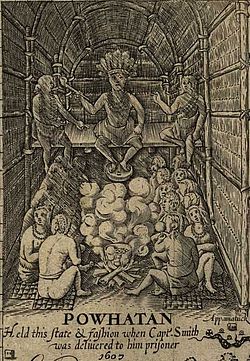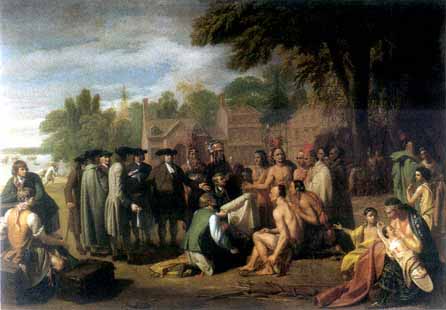
Succeeded by his brother
Opechancanough, the new chief was much more confrontational than
his pacific older brother. In 1619, colonists were instructed
to respect the new emperor. http://www.personal.kent.edu/~dfriend/powhatan.htm
Investors in the Jamestown
Company was furious because they were being asked to recognize a
savage emperor's authority to control the company's land
sales. This contravened Lord Coke's argument that prerogative
powers over infidel lands were acquired by 'right of
conquest.' The savages 'laws' were moot at the moment of
conquest because they were presumed to be in violation of the laws
of God and nature.

Jamestown settlers meet with Chief Powhatan, the father
of Pocahontas.
The problem in Virginia was that none
of the Indians had been 'conquered.' Therefore, the rights
claimed by the Virginia Company had not been formally vested by the
rights of conquest.
Robert Williams
notes that the medievally derived presumptions that diminished the
rights of infidels could not overcome this fact. There was no
room in this paradigm of infidel conquest for a competing
sovereignty in an unconquered slave ruler. As Lord Coke had
ruled in court in England, infidel laws were contrary to the laws
of God and nature. To acknowledge a savage king's sovereignty
and counter English claims of land acquisition by conquest would
mean that the English had fallen under the authority and
jurisdiction of a savage whose laws were contrary to those of
God. And that would not stand. So, in English legal
theory of colonization, savages could never validly exercise
sovereignty. Sovereignty, by its definition, was a power
exercised by civilized peoples who recognized the greater
theocratic laws of God and nature.
The company
also realized that until the Indian chief was brought to his knees,
the company's monopoly over distant lands was a fiction, and the
only solution was to conquer the heathen and be done with it.
But irony of ironies, as these points were being debated by company
shareholders in London, the new Indian chief was coming to the same
conclusion on his own. He rallied his troops and launched an
assault on the settlers in March and killed more than 300 of the
settlers in a surprise attack. Though he had won the first
battle (we will see this time and again), he had given the English
the justification they needed to wage war.
Related Events
Related Flashpoints